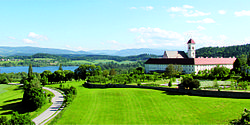St. Georgen am Längsee
St. Georgen am Längsee | |
|---|---|
 Sankt Georgen Abbey | |
| Coordinates: 46°47′N 14°26′E / 46.783°N 14.433°E | |
| Country | Austria |
| State | Carinthia |
| District | St. Veit an der Glan |
| Government | |
| • Mayor | Konrad Seunig (SPÖ) |
| Area | |
| • Total | 69.81 km2 (26.95 sq mi) |
| Elevation | 537 m (1,762 ft) |
| Population (2018-01-01)[2] | |
| • Total | 3,648 |
| • Density | 52/km2 (140/sq mi) |
| Time zone | UTC+1 (CET) |
| • Summer (DST) | UTC+2 (CEST) |
| Postal code | 9330, 9313 |
| Area code | +43 4213 |
| Website | www.stgeorgen-laengsee.at |
St. Georgen am Längsee (Slovene: Šentjurij ob Dolgem jezeru) is a municipality in the district of St. Veit an der Glan in Carinthia, Austria.
Geography
[edit]St. Georgen is located at the Längsee north of the Zollfeld Valley. In the east, the Gurk River flows southwards into the Klagenfurt basin. The municipal area comprises the cadastral communities of Goggerwenig, Gösseling, Launsdorf, Osterwitz, and Taggenbrunn as well as famous Hochosterwitz Castle in the south.
History
[edit]The settlement arose from the former St. Georgen monastery of Benedictine nuns established about 1002/08 by the local Countess Wichburg, a granddaughter of the Bavarian duke Eberhard. Rebuilt in a Baroque style, it was dissolved by order of Emperor Joseph II in 1783. Today the premises serve as a conference centre.
Politics
[edit]Seats in the municipal assembly (Gemeinderat) as of 2009[update] elections:
- Social Democratic Party of Austria (SPÖ): 11
- Freedom Party in Carinthia (BZÖ): 8
- Austrian People's Party (ÖVP): 3
- ERNST (Independent): 1
Twin towns — sister cities
[edit]St. Georgen is twinned with:
References
[edit]- ^ "Dauersiedlungsraum der Gemeinden Politischen Bezirke und Bundesländer - Gebietsstand 1.1.2018". Statistics Austria. Retrieved 10 March 2019.
- ^ "Einwohnerzahl 1.1.2018 nach Gemeinden mit Status, Gebietsstand 1.1.2018". Statistics Austria. Retrieved 9 March 2019.



